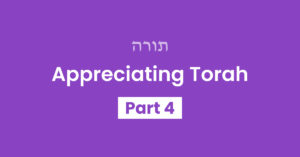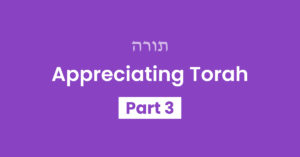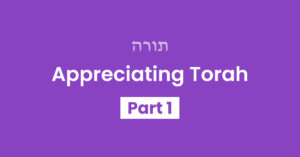Last week, we discussed how everything in this world was created for the Torah. It’s not that Hashem created us with parents, and therefore He decided to give us the mitzvah of Kibbud Av V’Aim. Rather, Hashem first created the Torah – which includes the mitzvah of Kibbud Av V’Aim – and only afterwards did He create us with parents so that we would be able to fulfill the mitzvah of Kibbud Av V’Aim. Everything in this world was created for the purpose of Torah and mitzvos.
Interestingly, the Sifsei Chaim1 takes this concept a step further: Not only did Hashem create parents, trees, flowers, bugs, the moon, and esrogim for the purpose of our keeping mitzvos, but Hashem also created every detail of our personal lives for the purpose of Torah and mitzvos.
Hashem also created every detail of our personal lives for the purpose of Torah and mitzvos.
What does this mean?
We often feel that there are certain aspects of our lives that make it difficult for us to keep the mitzvos. Maybe you were born with difficult parents who make it hard for you to fulfill the mitzvah of Kibbud Av V’Aim. Maybe you were given challenging children or siblings who make it difficult for you to hold back your anger. Maybe you were created with a weaker mind which makes it difficult for you to learn Torah or remember halachos.
When we encounter difficulties like these, we tend to feel that we are living a “bidieved” (less-than-ideal) life. We feel that our lives would be better if we would have been created with nicer parents, easier children, or a stronger intelligence. We sigh in resignation and try to accept our “less-than-ideal” situation, and struggle to keep the mitzvos “despite” our unfortunate circumstances.
It’s normal to think this way, but the truth is that this perspective is seeing the world from a backwards perspective. It’s not that Hashem wishes for an ideal world in which you would have perfectly easy children and no trouble controlling your temper. Rather, Hashem specifically created you with these difficulties so that you would have the opportunity to invest effort in keeping the mitzvos, which is the entire purpose of Creation.
Hashem specifically created you with these difficulties so that you would have the opportunity to invest effort in keeping the mitzvos, which is the entire purpose of Creation.
Perhaps Hashem gave you difficult parents so that you can work extra hard on earning the mitzvah of Kibbud Av V’Aim. Perhaps Hashem gave you challenging children so that you can work extra hard on conquering your anger. Perhaps Hashem gave you a weaker mind so that you can earn extra reward for all your efforts to learn Torah.
What Are We Really Here For?
The purpose of life is not to have it easy. Chazal teach us: “Adam L’Amal Yulad – Man was created to work hard.”2 Hashem didn’t create us to just lay back and enjoy a smooth life; rather, we were created to work hard and earn closeness to Hashem through our performance of mitzvos.
We are also taught: “L’fum Tzaara Agra – The greater the difficulty, the greater the reward.”3 Our struggles to keep the mitzvos are not a “bidieved” (less-than-ideal) situation; rather, our struggles are simply the very real and ideal state that Hashem chose for our existence on this earth. Our struggles are meant to help us earn as much reward and closeness to Hashem as possible, which is the purpose of our creation.
Every single aspect of our personal lives – every struggle that we experience – was determined by Hashem, and perfectly orchestrated in order to maximize our opportunities to keep Torah and mitzvos. The Torah is the blueprint not only for the world as a whole, but for our pesronal lives as well.
The Torah is the blueprint not only for the world as a whole, but for our personal lives as well.
Having this perspective can completely change our perspective on how we see the difficulties we face in life. Instead of thinking: “Hashem wants me to honor my parents, but – UNFORTUNATELY – my parents are harder to honor than most other parents.” Rather, we can now understand: “Hashem wants me to honor my parents, and therefore He gave me difficult parents so that I can have the opportunity to work hard on this mitzvah.”
This perspective may be very difficult to swallow and integrate into our hearts, but it is nevertheless important to keep in mind this broader perspective of truth.
This week let’s try to look at our own personal lives through the prism of Torah. Let’s try to see how every detail of our lives is l’chatchilah (ideal), and is part of Hashem’s master plan for the universe, to help us all achieve the goal of fulfilling Torah and mitzvos.
Sources: [1] Sifsei Chaim Moadim Vol. 3 pg. 190; [2] Iyov 5:7, see Sanhedrin 99b; [3] Pirkei Avos 5:23
Your Challenge
Once a day, notice something that seems uncomfortable or “less than ideal” in your personal life, and say: “I know Hashem put this into my life so that I could have the opportunity to fulfill the Torah and mitzvos.”
FOR EXAMPLE:
- Perhaps Hashem gave me difficult parents so that I can work to fulfill the mitzvah of Kibbud Av V’Aim.
- Perhaps Hashem made me be stuck in traffic today so that I can have the opportunity to work on my middah of patience.
- Perhaps Hashem gave me a neighbor who is so needy, so that I can work on stretching myself in my middah of Chessed.
- Perhaps Hashem did not give me so much money so that I wouldn’t become too distracted with thinking about my possessions all day and what new things to buy.
Torah Questions
- According to Devarim 32:47, the Torah is not a _____ thing for us; rather, it is our _____?
- According to Mishlei 3:17, the ways of the Torah are _____?
- Accoridng to Mishlei 6:23, mitzvos are compared to __?__ and the Torah is compared to __?__.
- According to Rashi on Devarim 6:7, the words of Torah should be __?__ in our mouths.
- According to Rashi on Devarim 32:46, a person must make sure that his ____, _____, and _____ are always ready and prepared to receive words of Torah.
- What word is used to refer to the Torah in Mishlei 3:19? (See Rashi)
- According to Sotah 14a, the Torah begins and ends with _____?
Questions to Ponder
- Rashi says that the entire world was created for the sake of “Reishis” – which refers to either the Torah, or the Jewish people (both of which are sometimes called “Reishis.”) Why do you think that both of these need to be mentioned separately? Why wouldn’t it be enough to just say that the world was created “for the Jewish people who keep the Torah”?
- In Yirmiyahu 2:8, it says that people who “grasped the Torah” did not know Hashem. How is this possible? Wouldn’t you think that anyone who learns Torah must obviously know Hashem?
- The Zohar says that all the wars in the world are wars of destruction, but all wars of Torah are wars of love and peace. What do you think this means?
- The Gemara writes that if a person is meritorious, then the Torah will be for him an elixir of life, but if a person is not meritorious, the Torah becomes a poison for him. How could this be? How could the Torah be like a poison for someone?




